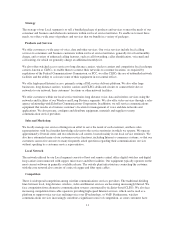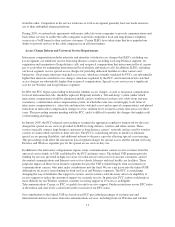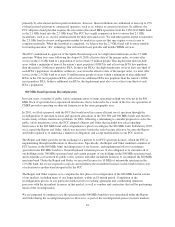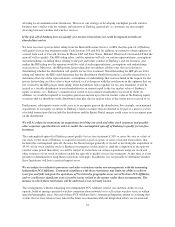Sprint - Nextel 2005 Annual Report Download - page 32
Download and view the complete annual report
Please find page 32 of the 2005 Sprint - Nextel annual report below. You can navigate through the pages in the report by either clicking on the pages listed below, or by using the keyword search tool below to find specific information within the annual report.• consolidating and integrating duplicative facilities and operations, including back-office systems;
• addressing differences in business cultures, preserving employee morale and retaining key employees,
while maintaining focus on providing consistent, high quality customer service and meeting our
operational and financial goals; and
• adequately addressing business integration issues while also planning and preparing for the contemplated
spin-off of Embarq.
The process of integrating Nextel’s operations with ours could cause interruptions of, or loss of momentum in,
our business and financial performance. The diversion of management’s attention and any delays or difficulties
encountered in connection with the integration of the two companies’ operations could have an adverse effect on
our business, financial condition or results of operations. We may also incur additional and unforeseen expenses
in connection with the integration efforts. There can be no assurance that the expense savings and synergies that
we anticipate from the merger will be realized fully or within our expected timeframe.
We also recently acquired five PCS Affiliates (US Unwired, IWO Holdings, Gulf Coast Wireless, Alamosa
Holdings and Enterprise Communications), and will acquire Nextel Partners when the required regulatory
approvals are obtained. The process of integrating the business practices, operations and support functions of
these companies could involve challenges similar to those identified above or add to those challenges by placing
a greater strain on our management and employees.
Operational challenges, proposed tax law changes and other uncertainties may make it difficult or less
economical to complete the contemplated spin-off of Embarq on terms that are acceptable to us. Failure to
complete the spin-off could adversely affect our growth.
There are significant operational and technical challenges that need to be addressed in order to separate the assets
and operations of Embarq from the rest of our business in connection with the planned spin-off of Embarq to our
shareholders. The spin-off will require the creation of a new publicly traded company with a capital structure
appropriate for that company, the creation and staffing of operational and corporate functional groups and the
establishment of ongoing commercial arrangements and transition services arrangements between us and
Embarq. The spin-off may result in additional and unforeseen expenses, and completion of the spin-off cannot be
assured because it is conditioned upon, among other things, receipt of required consents and approvals from
various federal and state regulatory agencies, including state PUCs. These consents and approvals, if received,
may impose conditions and limitations that could jeopardize or delay completion of the spin-off and could reduce
the anticipated benefits of the merger and the spin-off.
The U.S. House of Representatives and the U.S. Senate have separately approved legislation either of which
would, if enacted, make certain changes to Section 355 of the Internal Revenue Code of 1986, as amended, or the
Code, which governs the tax treatment of the spin-off. These bills, which are currently subject to conference
negotiation between members of the House and Senate, contain similar, but not identical provisions. In addition,
the U.S. Department of the Treasury has recommended a similar provision regarding spin-offs in its revenue
proposals for the fiscal year 2007 budget. After consultation with our tax advisors, we believe that it is unlikely
that any of the proposed legislation, as currently drafted, would prevent the contemplated spin-off of Embarq.
However, if we are unable to obtain satisfactory opinions from counsel regarding the tax-free qualification of the
spin-off, our Board of Directors would consider several options, including electing not to complete the spin-off.
We expect to receive approximately $6.6 billion in the form of cash and senior notes of Embarq in exchange for the
assets contributed to Embarq. We expect to sell the senior notes issued to us and intend to use the proceeds from any
such sale and the proceeds paid to us by Embarq to repay various obligations. There can be no assurance of the final
amount of indebtedness to be incurred by Embarq or the proceeds to be received by us.
If the contemplated spin-off of Embarq is not completed, we may have slower rates of growth than currently
expected because of the industry-wide trends of increased competition and product substitution that are adversely
21
























